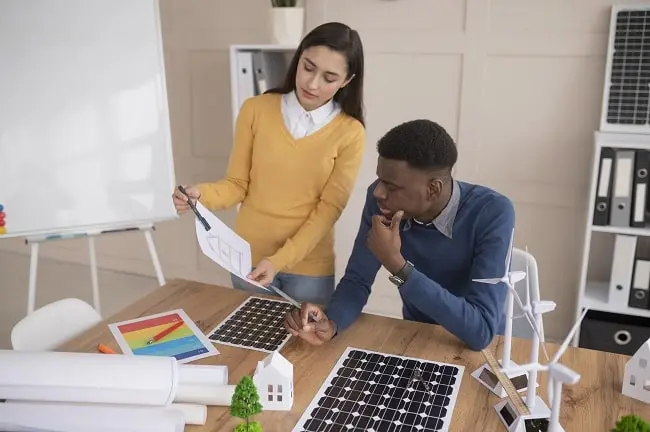At a glance
- Learn DIY home energy audit techniques to pinpoint where your energy usage and save on bills.
- Compare professional energy audits to DIY methods.
- Get insider tips on finding the right energy auditor.
Have you ever wondered where all your energy usage is coming from? If yes, then it’s time to conduct a home energy audit. Uncovering clues that lead to energy savings. Whether you’re in VIC, QLD, NSW, SA, or ACT, this guide will walk you through doing your own home energy audit.
Basics of a Home Energy Audit
It is a check-up for your home’s energy use. This process is simple, and you can do it with some know-how.
Access Your Energy Data
The first step is to examine your energy bills for the past 12 months. This will give you a baseline understanding of your consumption patterns. Look for any spikes or trends. Maybe your energy use jumps in the winter (hello, VIC and TAS residents) or summer (looking at you, SA, QLD and NSW).
But don’t stop there. Consider renting or purchasing an electricity monitor.
Analyse Your Energy Use
Comparing your energy use over time can reveal a lot. Notice your bills creeping up during certain times of the year? That’s a red flag signalling which areas of your home to audit first.
Graphing your energy use against time (or against production if you work from home) can help identify patterns and help you become more energy efficient.
Track Your Improvements
Now, for the rewarding part: tracking your progress. Once you start making changes, keep an eye on your energy consumption.
Dive Deeper with a DIY Home Energy Audit
Professional home energy audits offer a meticulous analysis. They include homeowner interviews, room-by-room assessments, safety inspections, and advanced tests like a blower door and thermographic scans.

These audits provide a detailed report of findings and recommendations but come at a cost. It could average around $400 but can vary significantly based on your home’s size and the auditor’s tools.
The DIY Advantage
Conducting a DIY home energy audit means you might not have access to sophisticated tools used in professional audits. Yet, you can still identify significant energy leaks and inefficiencies.
Ready to get your hands dirty? Let’s break down the key areas to focus on in your home energy audit:
Insulation and Windows
Check for drafts around doors, windows, and any other openings. On a windy day, use a stick of incense to detect air movement around these areas. Simple fixes like sealing these leaks, weather stripping, or caulking can make a big difference.
Heating and cooling systems
It should be properly maintained and upgraded to more efficient models to save energy and reduce your energy costs. Change air filters regularly. Smart thermostats can also help manage heating and cooling more efficiently.
Lighting
Still using incandescent bulbs? Switch to LED bulbs to reduce your lighting energy use by up to 75%. It’s an easy win.
Phantom Loads
Identify and manage “phantom” energy consumption by appliances and electronics in standby mode. Power strips are used for devices like chargers, computers, and TVs. This allows you to easily cut off power when they’re not in use, tackling the hidden energy drain and giving you an energy saving.
Attic Insulation
Poor attic insulation contributes to the “chimney effect,” especially in colder climates. Your attic needs to be adequately insulated and vents unblocked to keep the desired temperature in your home more consistent.
Refrigerator Efficiency
Inspect the trim on your fridge door for wear and ensure it seals tightly to keep cold air in. Cleaning the coils on the back or underneath your refrigerator can also improve efficiency and reduce energy consumption.
Get more insights into energy discounts by reading this article.
Why is a Home Energy Audit important?
By comparing home energy use and conducting a thorough home energy assessment, you’re not just cutting costs, but also contributing to a larger effort to conserve our planet’s resources.
Furthermore, who knows what savings (and surprises) you’ll uncover along the way?
Types of Home Energy Audits
Each type offers varying detail and precision, allowing you to choose the best fit for your needs and budget. Here’s a breakdown of the main types of home energy audits:
Basic or Type 1 Energy Audit
A Type 1 audit is the most straightforward and cost-effective option. It provides a general overview of your home’s energy consumption. It identifies obvious areas for improvement with relatively short payback periods. Particularly suitable for smaller homes or if you’re just beginning to explore energy efficiency. This DIY energy audit involves:
- A visual inspection of the home’s energy systems.
- A review of past utility bills to identify consumption patterns.
- Basic recommendations for improving energy efficiency.
- Good starting point for making minor adjustments in your energy usage.
Detailed or Type 2 Energy Audit
A Type 2 energy audit offers a more comprehensive analysis of your home’s energy consumption. This do-it-yourself home energy audit includes everything in a Type 1 audit, plus:
- Detailed data collection and analysis of specific equipment and operating conditions.
- A financial evaluation of potential energy-saving measures to help prioritise investments.
- Consideration of the home’s overall comfort and air quality.
Type 2 audit is recommended for homes with higher energy bills or those that have already implemented basic energy-saving measures.
Precision or Type 3 Energy Audit
The Type 3 energy audit is the most thorough option. This audit focuses on the detailed analysis of major subsystems, such as heating, ventilation, and air conditioning (HVAC) systems, insulation levels, and window efficiency. This audit involves:
- Advanced diagnostic testing, including blower door tests for air leakage and thermographic scans to visualise heat loss.
- An in-depth review of the home’s construction and energy systems.
- Precise quantification of potential energy-saving measures, including estimated costs and payback periods.
Type 3 audits are best suited for larger homes, those with significant energy consumption, or homes undergoing major renovations which can support your objective to make your home more energy efficient.
After the Audit
After identifying areas for improvement through your audit,
- Prioritise easy fixes you can do yourself, such as sealing leaks or updating lighting.
- Evaluate more complex issues to decide if professional help is needed. This could include major insulation upgrades or repairing broken seals.
If your DIY audit suggests deeper issues, consider a professional audit. This could uncover even more opportunities for energy savings and home energy efficiency improvements.
Compare home energy in VIC, ACT, SA or wherever you are with Select and Switch, your easy-to-use comparison tool.
How to find and choose the right energy auditor?
When you find the task of billing analysis and detailed audits beyond your DIY capabilities. It’s time to call the experts for a professional home energy assessment. But how do you find a reliable auditor for your home? Here are some tips to guide you through the process:
Asking for Recommendations
Reach out to friends, family, or neighbours who have had energy audits done. Personal referrals can lead you to trustworthy professionals. Websites of local or national energy efficiency organisations often list certified energy auditors.
Contact Utility Companies
Some utility providers offer free or discounted energy audit services for their customers. Even if they don’t provide the service directly, they can usually recommend reputable auditors.
Check Qualifications
In Australia, auditors should comply with the Australian Standards (AS/NZS 3598) for energy audits. This ensures they have the proper training and adhere to industry best practices.
Experience Matters
Look for an auditor with experience specific to your type of home and its energy systems. If you have unique features like solar panels or a geothermal system, find someone familiar with these technologies.
Know What to Expect
A good auditor will explain the audit process before it begins. They outline the duration of inspection and appliances. At the end of the audit, you receive a detailed analysis report and recommendations for energy efficiency improvements.
Technological Edge
Professional auditors use specialised tools like blower doors, infrared cameras, and combustion analysers to detect air leaks, insulation gaps, and appliance efficiency. Confirm that the auditor has access to and expertise with this equipment.
Comprehensive Approach
Choose an auditor who takes a holistic view of your home. They should consider everything from the building envelope (walls, windows, insulation) to heating and cooling systems, lighting, and appliances.
Post-Audit Support
Check if the auditor assists or guides in implementing their recommendations. Some may even help you access rebates or incentives for energy efficiency upgrades.
H3 Get Multiple Quotes: Energy audit costs vary, so it’s wise to get quotes to compare home energy prices in VIC, SA, QLD or NSW. Remember, the cheapest option isn’t always the best—focus on value and quality.
In conclusion, both DIY and professional home energy audits are a step towards understanding and helping you reduce energy use, as well as improving your home’s energy efficiency. Starting with simple, actionable steps can lead to noticeable improvements and save you money. Both DIY efforts and potential professional insights can help you identify and make impactful change. This will benefit both your wallet and the environment.


